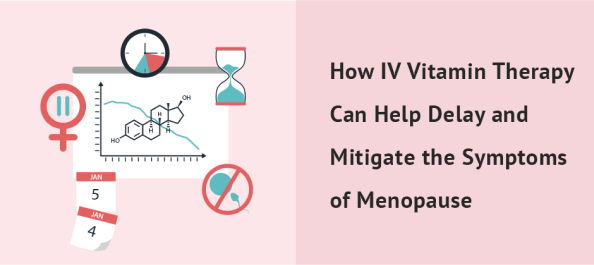
Menopause is a natural biological process that marks the end of a woman’s reproductive years. For many women, moving beyond monthly periods and the risk of pregnancy is a welcome relief. But before we hit the pause button, our bodies have to go through multiple hormonal shifts that cause uncomfortable and inconvenient symptoms. Today, more women than ever are seeking natural solutions for treating menopausal symptoms, and many are turning to IV Vitamin Therapy.
Signs that you may be going through menopause include:
- Difficulty sleeping and night sweats
- Irregular periods
- Dry vaginal membranes
- Chills and/or hot flashes
- Moodiness
- Dry skin and changes in hair texture/thickness
- Less energy and slower metabolism
- Weight gain in breasts and abdomen
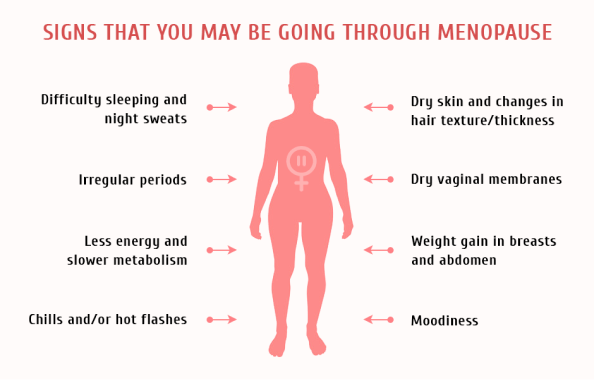
Understanding the hormonal changes that drive menopausal symptoms can help you better manage them, and maybe even delay them.
Biological Changes During Menopause
There are literally billions of chemical processes occurring in your body at any given time, throughout your entire life. Those processes are driven by a number of factors, including nutrition, but as you age they become less efficient and cells become damaged.
Your brain, muscle, and fat cells all have hormone receptors. Hormones are signaling molecules that regulate cellular activity. Their job is to respond to stimuli, to maintain your body in a state of chemical balance, or homeostasis. When you can no longer maintain homeostasis, your cells become damaged and you are more likely to get metabolic diseases like diabetes, hypertension and heart disease.
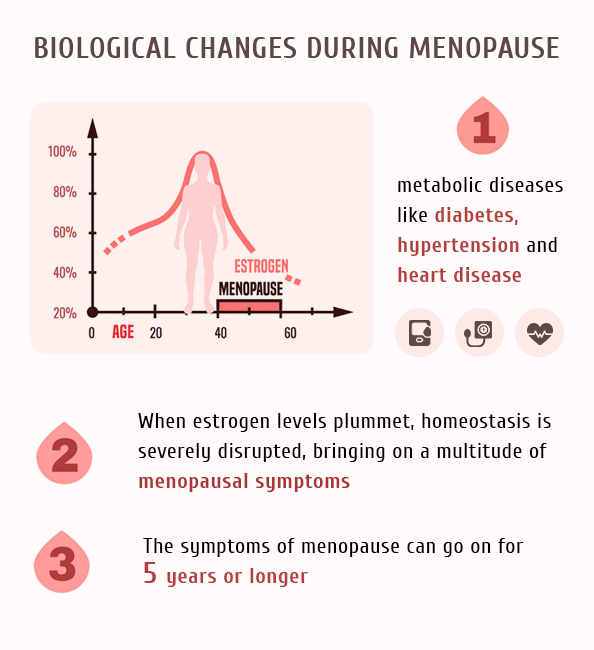
Hormonal activity is regulated by the hypothalamus region of your brain. When your brain is healthy, your body is better able to maintain homeostasis, meaning less disease and better cellular function throughout your body. When homeostasis is out of whack, the hypothalamus triggers the release of certain hormones to restore it.
But hormones also work as feedback messengers from the body to the brain, alerting it to any changes. Menopause is marked by an abrupt and severe drop in estrogen, the primary hormone responsible for female fertility. When estrogen levels plummet, homeostasis is severely disrupted, bringing on a multitude of menopausal symptoms.
The symptoms of menopause can go on for 5 years or longer, although they diminish over time and finally fade away.
Menopause and Aging
Because hormones are vital to homeostasis, the dramatic drop in estrogen after menopause impacts your body in many undesirable ways.
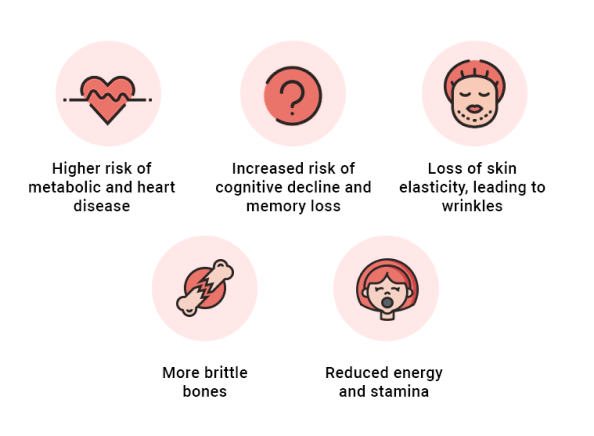
- Higher risk of metabolic and heart disease
- Increased risk of cognitive decline and memory loss
- Loss of skin elasticity, leading to wrinkles
- More brittle bones
- Reduced energy and stamina
Hormone replacement therapy (HRT) that artificially boosts estrogen levels can help reduce menopause symptoms and slow the adverse effects of aging, but too much estrogen has been linked to endometrial cancer.
The Best IV Vitamin Drips for Menopause
One marker of aging that is both a cause and an effect is declining levels of nicotinamide adenine dinucleotide (NAD), a vital metabolic regulator. NAD is a coenzyme that works with enzymes to regulate cellular functions. It also plays an important role in maintaining mitochondrial health.
Mitochondria are tiny organelles within your cells that use oxygen, fats and carbs to produce energy. Mitochondria shrink in size and number as you age, making cellular metabolism less efficient and slowing down energy production.
Regular exercise can help increase the size and number of your mitochondria, but without adequate NAD, they may not function at full capacity. Supplementing NAD via IV Vitamin therapy provides the precursors your body needs to boost NAD production.
When combined with a nutrient-dense diet and exercise, supplementing with NAD can profoundly impact menopausal symptoms and slow the aging process.
- Boosts brain and nervous system function
- Improves liver function
- Enhances muscle cells
- Protects your heart and endothelium
- Boosts fertility
- Supports your immune system
- Increases fat metabolism and energy production
- Improves pancreas function
- Supports kidney function
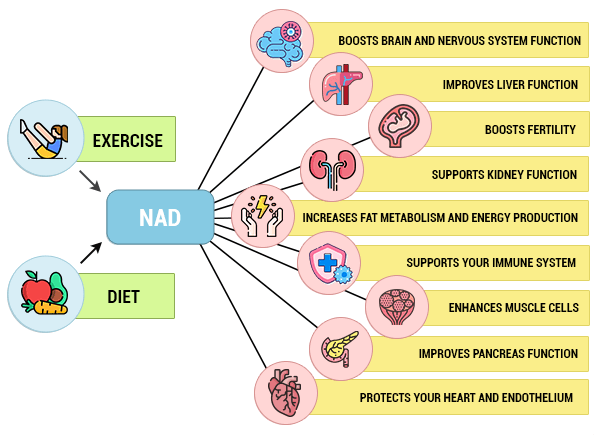
In addition to NAD, research has found that women who consume a diet rich in antioxidants experience fewer symptoms of menopause, including hot flashes, sweating, sleep problems, anxiety, fatigue and brain fog. Antioxidants also help prevent major chronic diseases like heart disease and cancer, including breast cancer.
The most potent antioxidants for menopause are Vitamins A, C and E, and Glutathione.
IV Vitamin therapy can help you replenish and maintain optimal levels of NAD and antioxidants, to manage the symptoms of menopause and slow the aging process.
Oral Supplements vs IV Therapy for Menopause
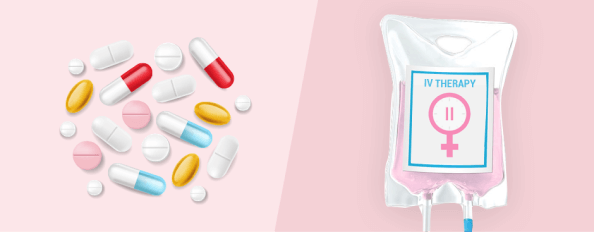
Taking supplements by mouth is a hit-or-miss proposition. Because oral supplements need to be broken down in your digestive tract before they can be absorbed and transported, delivery can be delayed, and oral supplements often lose their potency during the digestive process. In fact, some supplements pass right through your system without being fully digested.
The most direct way to deliver nutritional supplements to your cells is via intravenous infusion. IV therapy for menopause bypasses your digestive tract, as an IV vitamin cocktail drips slowly into your bloodstream and enters your circulation. From there, the nutrients travel rapidly to cells throughout your body. IV Vitamin therapy ensures that nutrients are fully absorbed for optimal effectiveness in combating the symptoms of menopause.
Request a Consultation or Schedule an IV Vitamin Therapy Session
Menopause may be inevitable, but you don’t have to stand by and suffer from its symptoms. Vitamin therapy for menopause with NAD and antioxidants can help you reduce the severity of symptoms and even slow the onset of menopause. To get more information, or to schedule an IV Vitamin Therapy session, please complete the contact form on our website, and one of our qualified clinicians will contact you.
Resources
Abshirini, Maryam, et al. “Dietary total antioxidant capacity is inversely related to menopausal symptoms: a cross-sectional study among Iranian postmenopausal women.” Nutrition 55 (2018): 161-167.
Braidy, Nady, et al. “Role of nicotinamide adenine dinucleotide and related precursors as therapeutic targets for age-related degenerative diseases: rationale, biochemistry, pharmacokinetics, and outcomes.” Antioxidants & redox signaling 30.2 (2019): 251-294.